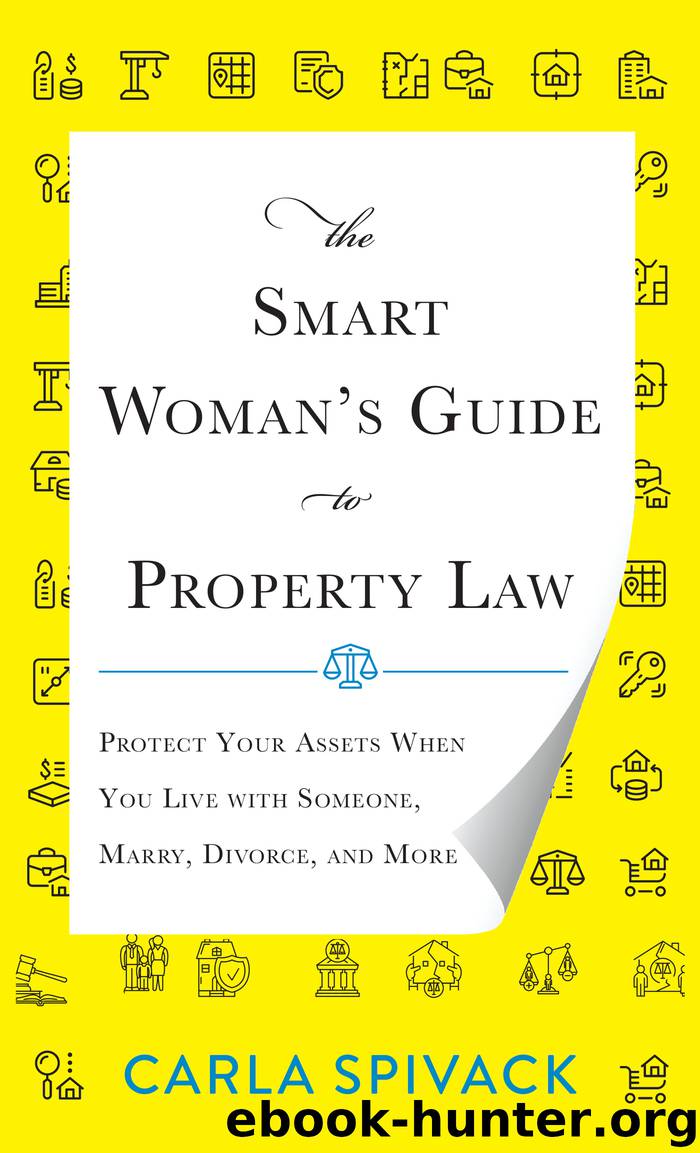The Smart Woman's Guide to Property Law by Carla Spivack

Author:Carla Spivack
Language: eng
Format: epub
Tags: undefined
Publisher: Rowman & Littlefield Publishers
Published: 2012-04-17T16:00:00+00:00
Sharing Some Goodwill
If your husband owns a business or professional practice such as a medical, dental, or legal practice, there is another intangible but very valuable asset that courts refuse to count as property in a divorce: the “goodwill” of that business or practice. Goodwill refers to intangible assets that contribute to the success of a business beyond the cash value of its assets (such as its income or physical equipment it owns). These intangible assets include the reputation of the business and its owner, location, effectiveness of its advertising, the skill of the people who work on that business, and so on.
Goodwill is often the most substantial value of a business or a professional practice, especially in small businesses or single-person offices such as a doctor or a lawyer might have. Statistically, more men than women are likely to own these businesses. But their financially dependent wives often contribute significantly to the goodwill of the business by helping their husbands run them either formally or informally. Still, courts routinely fail to divide the goodwill of a business fairly between spouses when they divorce and instead continue to cheat women of wealth they helped create.
Take, for example, the case of Daniel and Kleo, who were married for five years.[29] One year before they got married, Daniel set up his own chiropractic office and began practicing. During the marriage, he paid off his educational loans with marital funds, the couple both worked in the office, and for a time lived on the business premises. Daniel also traveled a lot on the weekends to workshops to further his professional skills, leaving Kleo to care for the home and their young daughter. Kleo even lent Daniel money both before and after the marriage to invest in the business. So that Daniel could reinvest his earnings in the business, Kleo worked two jobs in addition to her work in the chiropractic office.
Given her investment in her husband’s practice, when the couple divorced, Kleo claimed she should receive a share of the goodwill of the practice. The court found that the practice had almost no goodwill value as of the date of the marriage, but by the time the couple broke up, the value of the business had increased to $134,463, of which $102,991 was goodwill. The trial judge found that the value of the practice was a result of the joint efforts of both parties and awarded Kleo 50 percent of the goodwill value of the business. Daniel appealed, and the higher court reversed, holding that the goodwill of the business was not property that could be divided between the spouses.
Courts that do divide the goodwill of a business or practice between spouses often differentiate between “business” goodwill, which comprises the overall reputation and other intangible assets of the business itself such as its location, and “personal” or “professional” goodwill, which grows over the years as a professional gradually gains expertise and experience in the field. Personal goodwill is, really, another form of enhanced earning capacity.
Download
This site does not store any files on its server. We only index and link to content provided by other sites. Please contact the content providers to delete copyright contents if any and email us, we'll remove relevant links or contents immediately.
| Budgeting & Money Management | College & Education Costs |
| Credit Ratings & Repair | Retirement Planning |
The Compound Effect by Darren Hardy(8949)
Tools of Titans by Timothy Ferriss(8369)
Nudge - Improving Decisions about Health, Wealth, and Happiness by Thaler Sunstein(7694)
Win Bigly by Scott Adams(7184)
Deep Work by Cal Newport(7068)
Rich Dad Poor Dad by Robert T. Kiyosaki(6613)
Principles: Life and Work by Ray Dalio(6422)
Pioneering Portfolio Management by David F. Swensen(6289)
Digital Minimalism by Cal Newport;(5750)
The Barefoot Investor by Scott Pape(5743)
Grit by Angela Duckworth(5605)
The Slight Edge by Jeff Olson(5410)
Discipline Equals Freedom by Jocko Willink(5381)
The Motivation Myth by Jeff Haden(5206)
You Are a Badass at Making Money by Jen Sincero(4925)
The Four Tendencies by Gretchen Rubin(4595)
Eat That Frog! by Brian Tracy(4526)
The Confidence Code by Katty Kay(4251)
Bullshit Jobs by David Graeber(4179)
